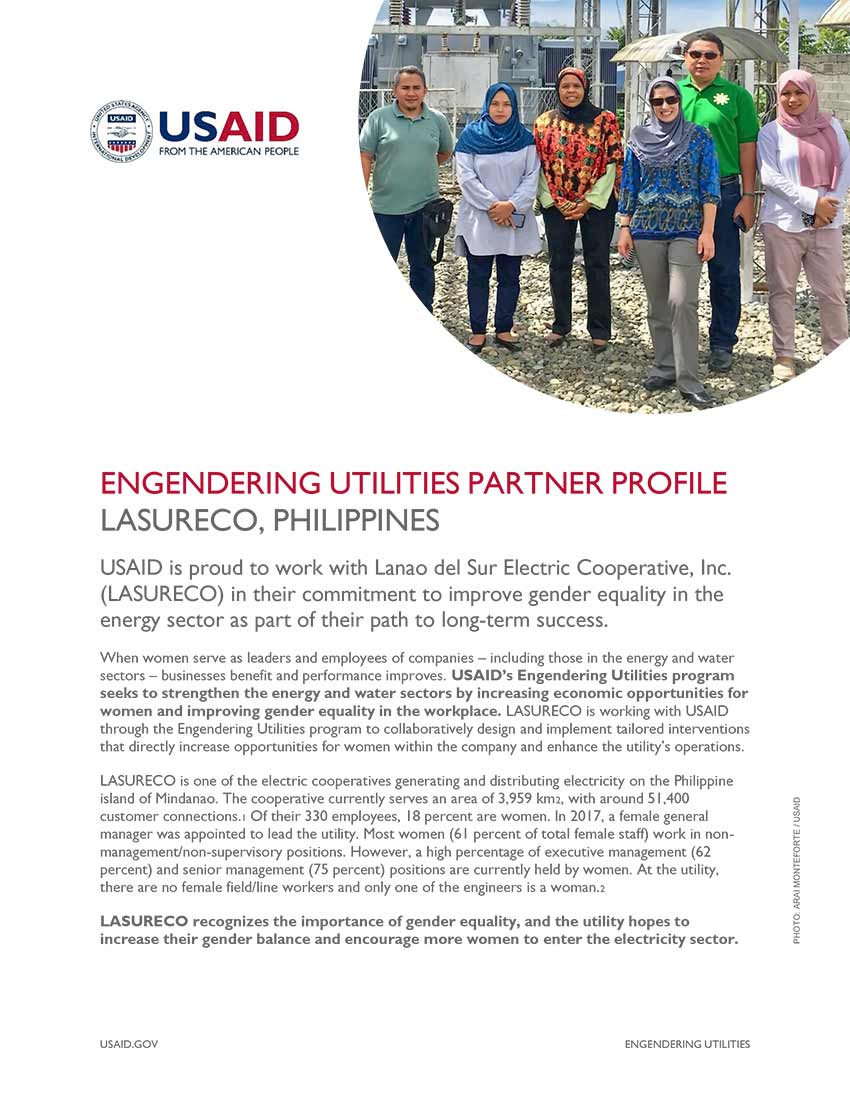LASURECO generates and distributes electricity on the island of Mindanao, and serves an area of 3,959 square kilometers, with around 51,400 connections. Of their 330 employees, 18 percent are women. USAID is proud to work with LASURECO in their commitment to improve gender equality in the energy sector as part of their path to long-term success.
The National Power Corporation of the Philippines owned and operated all generation and transmission assets in the country until 1987, when the government first began allowing independent power producers to participate in the market. In 2001, the Philippines passed the Electric Power Industry Reform Act (EPIRA) with the goal of liberalizing and unbundling the power sector to promote competition. By the end of 2013, the power sector in the Philippines had become one of the most extensively privatized in the region.
The International Labour Organization reports that approximately 45 percent of Filipina women participate in the labor market. In LASURECO’s region of the Philippines, cultural norms also challenge women’s equal participation in the energy sector. Families are also mindful of the potential negative association between women who work in particular capacities; while administrative roles are largely accepted, jobs such as meter-reading and validation or any task that requires pole-climbing are all prohibited and reflect poorly upon the family.
USAID is partnering with LASURECO through the Engendering Utilities program to assess and identify high-impact interventions that can improve gender equality within the organization. LASURECO will also place a strong emphasis on engaging influential male leaders as champions of gender equality.
Prior to engaging with Engendering Utilities, LASURECO took the initiative to improve gender equality, most notably in women’s representation at the leadership level: LASURECO’s Chief Executive Officer is a woman, and five of eight senior managers are women. The utility also addresses sexual harassment in their code of ethics.
USAID’s Engendering Utilities program works with organizations in male-dominated industries to increase economic opportunities for women, improve gender equality, boost business performance, and strengthen economies. Through a customized best practices framework, demand-driven coaching, and a Gender Equity Executive Leadership Program, Engendering Utilities builds the capacity of leaders to implement gender equality interventions that increase the professional participation of women and meet their core business goals.
Launched in 2015, the Engendering Utilities program demonstrates USAID’s commitment to promote a path to self-reliance and resilience in developing countries by fostering enterprise-driven innovation, inclusive economic growth, and gender equality and women’s economic empowerment. Engendering Utilities is a key activity under the U.S. Government’s Women’s Global Development and Prosperity Initiative (W-GDP), which aims to reach 50 million women by 2025 through innovative and effective programs.


Comment
Make a general inquiry or suggest an improvement.